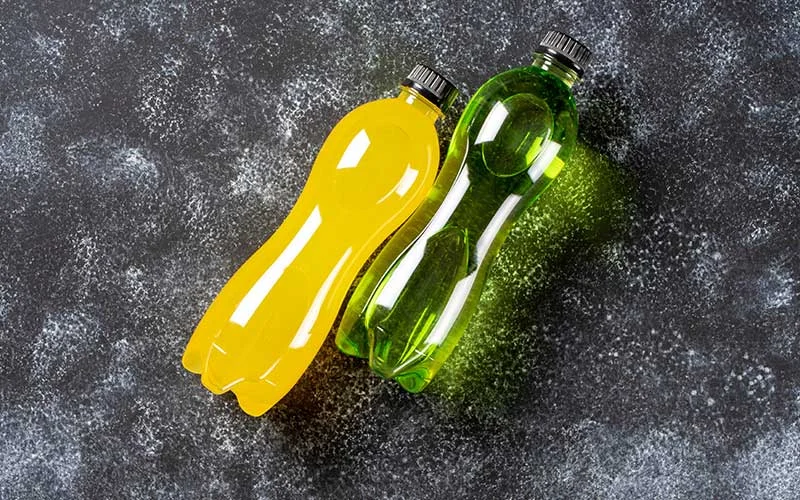In the pursuit of staying healthy, we often hear about the importance of staying hydrated. But did you know there’s such a thing as too much water?
Overhydration, also known as water intoxication or hyponatremia, is a condition where the balance between the water you consume and your body’s needs gets disrupted. This can result in several health problems impacting anyone, including athletes and people with certain medical disorders. This guide discusses overhydration, its causes, symptoms, risks, and ways to overcome it.
What is Overhydration?
Overhydration, also known as water intoxication or hyponatremia, happens when the body consumes more water than it can process. This leads to electrolyte imbalance and potential health issues. Water intoxication can occur when your water intake overwhelms your body’s ability to remove it properly [1].
In simple terms, overhydration occurs when the water intake surpasses its expulsion. This situation can arise due to underlying conditions that hinder water removal or cause water retention.
Ordinarily, the kidneys are proficient at ridding the body of excess water, making excessive water consumption a less common cause of overhydration [2]. Nevertheless, it becomes a concern if the body’s water balance goes awry.
What Causes Overhydration?
Excessive hydration can stem from consuming excess water or the kidneys retaining too much fluid. This may lead to water poisoning, where excessive water disrupts the balance of electrolytes in the body.
Low sodium levels, known as hyponatremia, can be a significant concern, resulting in cell swelling. Athletes, especially those participating in endurance sports, are particularly susceptible to overhydration due to excessive fluid intake during events. Other factors, such as certain illnesses, medications (like MDMA), and disrupted water regulation from conditions like congestive heart failure or kidney disorders, can also contribute.
Symptoms of Overhydration
Early indicators of overhydration might not be readily noticeable. However, the color of your urine is a reliable gauge of your hydration status. Aim for urine that resembles a light lemon-yellow shade. If your urine appears darker, it indicates that you require more water. Conversely, colorless urine signifies dehydration. If you develop hyponatremia due to water toxicity, you might experience the following symptoms:
Urine Color Check: Keep an eye on your urine color. A light lemon-yellow shade indicates good hydration. Darker shades suggest more water, while almost clear urine might indicate overhydration.
Feeling Unwell and Dizzy: Nausea and dizziness can manifest as your body’s way of signaling an imbalance.
Headaches: Intense headaches, accompanied by pressure inside the head, could indicate excessive water consumption affecting your well-being.
Excessive Fatigue: If you find yourself unusually tired and unable to overcome it with rest, it could be due to overhydration.
Muscle Discomfort: Aches and soreness in your muscles could point to excessive water intake, urging you to moderate your fluid consumption.
Who is at Risk for Overhydration?
Overhydration tends to be more common in endurance athletes who consume excessive water before and during their activities [3]. This phenomenon is observed in individuals participating in:
- Long-distance races exceeding 26.2 miles, such as marathons and ultramarathons.
- Endurance cycling events like Ironman triathlons.
- Rugby team members.
- Accomplished rowers.
- Military personnel undergoing training drills.
- Hikers and trekkers.
Diagnosing Overhydration
When diagnosing overhydration, healthcare professionals follow a careful process to ensure accurate results. This helps in identifying the right treatment plan for each individual. The diagnosis primarily involves:
Medical History
The doctor will first ask about your medical history to diagnose overhydration. They’ll want to know about recent changes in your water intake, medications, and existing health conditions. This information helps them understand your overall health and any potential factors contributing to overhydration.
Physical Examination
During the physical exam, the doctor will carefully examine you. They might check for signs like swelling in your hands, feet, or ankles, which could indicate excess fluid in your body. They’ll also assess your blood pressure and listen to your heart and lungs for any unusual sounds, as these can provide important clues about your fluid balance.
Diagnostic Tests
Diagnostic tests are crucial for confirming overhydration. Blood and urine tests can reveal important information about electrolyte levels and kidney function. Your doctor might also order imaging tests like chest X-rays to assess the size of your heart and lungs, which can be affected by excess fluid. These tests help the doctor get a clear picture of your condition and determine the best course of action for treatment.
Treatment for Overhydration

The method by which a person is treated is based on the onset of symptoms associated with water toxicity and the underlying cause of the ailment. However every person is different, so seek consultation from a physician before following any method. Possible treatment options may include:
Adjusting Fluid Intake
Regulating fluid consumption is crucial if overhydration symptoms like nausea or swelling arise. Curtail excessive water and sports drink consumption, and drink only when genuinely thirsty. This aids in restoring electrolyte balance and preventing further fluid retention.
Medication Adjustments
Healthcare professionals might recommend dosage adjustments or alternative medications when medications like diuretics contribute to overhydration. Diuretics augment urine production, potentially leading to excessive fluid loss. Doctors evaluate medication regimens and make necessary modifications to ensure a healthy fluid balance.
Treatment for Underlying Conditions
Overhydration stemming from underlying medical issues like kidney problems or hormonal imbalances necessitates tackling the root cause. Collaborating with healthcare experts results in personalized treatment plans involving medications, dietary changes, or other interventions targeting the underlying concern and averting overhydration.
Preventing Overhydration

Attaining the right fluid balance is paramount. To prevent overhydration, pay heed to your body’s cues. Drinking when you’re genuinely thirsty generally suffices. Remember, moderation is key.
Healthy Fluid Intake, Including Fresh Water, Juice, and Hydration Multiplier
Sustaining adequate fluid intake is vital for overall well-being. Water stands as an exceptional choice – calorie-free and hydrating. Fresh juices can offer a flavorful means of hydration and vitamin intake. Hydration multipliers can be beneficial for an added boost, although obtaining most fluids from plain water remains crucial.
Special Considerations for Athletes and Those with Certain Medical Conditions
Athletes and those with specific health conditions may necessitate distinct fluid intake strategies. Athletes should replenish lost fluids due to sweating, which is crucial for optimal performance. Individuals with specific health conditions might require vigilant monitoring of fluid intake. Consulting healthcare professionals or sports nutritionists is prudent for tailoring a hydration plan suited to individual needs.
FAQs
How Much Water is Too Much in a Day?
The kidneys can manage roughly 1 liter (about 0.2 gallons) of water per hour for adults. However, there isn’t a universal rule for the amount that can lead to overhydration. Adhering to your kidneys’ capacity is generally advisable. For children and older individuals, the equation gets more complex. Children should ideally drink a quantity of water close to their age in ounces each day.
Can Excessive Hydration Cause Permanent Damage?
Certainly, inundating your system with excessive water disrupts the balance of critical elements like sodium and other electrolytes, potentially leading to water toxicity. Cells, particularly in the brain, can swell, analogous to a marshmallow in a microwave – a grave situation. Untreated, it might even culminate in the most serious outcome – death and possible brain damage.
How Long Does it Take to Bounce Back From Overhydration?
Recovery duration hinges on symptom severity. In cases of pronounced water toxicity, hospitalization might be necessary. Recovery isn’t a one-size-fits-all scenario, emphasizing the importance of seeking medical attention if you suspect something’s amiss.
What’s the Best Way to Stay Hydrated Throughout the Day?
Establishing a consistent hydration routine is key. Keep a reusable water bottle on hand, taking periodic sips throughout the day. Aim to drink water preemptively before thirst sets in, as thirst often signifies early dehydration. Foods with high water content, such as fruits and vegetables, can also contribute to hydration goals.
Final Thoughts
Finding the ideal balance holds paramount significance on the journey to well-being, even in matters as fundamental as water consumption.
Drinking excessive water contradicts the message to stay hydrated. Armed with insights into causes, symptoms, and precautions, you can make informed decisions regarding fluid intake.Whether you’re an athlete striving for peak performance or pursuing overall health, moderation remains the guiding principle. Your body’s whispers of thirst deserve attentive listening. When it comes to overall well-being, it’s about getting everything in sync, including basics like drinking enough water.
Sources
[1] Brown, C. M., Barberini, L., Dulchavsky, S. A., Zona, R. (2019). Hyponatremia and water intoxication in the marathon runner: A forensic view. The American Journal of Forensic Medicine and Pathology, 40(3), 269-273. https://pubmed.ncbi.nlm.nih.gov/15829535/
[2] Gandy, J., Martinez, H., Kearney, J. (2019). Hydration and health promotion. Nutrition Bulletin, 44(4), 359-368. https://www.ncbi.nlm.nih.gov/pmc/articles/PMC9623173/
[3] American College of Sports Medicine. (2020). Position stand: Exercise and fluid replacement. Medicine Science in Sports Exercise, 39(2), 377-390. https://pubmed.ncbi.nlm.nih.gov/17277604/
RV Team
* Reviewology is in partnership or collaborates with top brands highlighted on this site, including those occupying the top ranking positions.
Additionally, we earn affiliate commissions from products showcased on this website when you make a purchase through the provided links on Amazon or the company website directly.
We appreciate your support using our links to purchase your favorite brands or newly discovered brands.
Latest updates
I Thought I’d Always Feel Tired, Fat, and Forgotten—Until This
310 Greens vs AG1
The Truth About 310 Greens: A No-Nonsense Review of This Popular Supplement
Popular
I Thought I’d Always Feel Tired, Fat, and Forgotten—Until This
310 Greens vs AG1
The Truth About 310 Greens: A No-Nonsense Review of This Popular Supplement
© 2024 Reviewology. All Rights Reserved.
